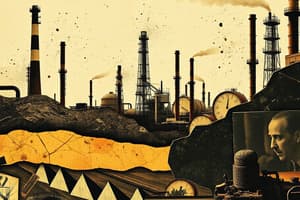Podcast
Questions and Answers
¿Cuál de los siguientes combustibles se caracteriza por ser una mezcla líquida volátil de hidrocarburos, principalmente alcanos, alquenos y alquadienos?
¿Cuál de los siguientes combustibles se caracteriza por ser una mezcla líquida volátil de hidrocarburos, principalmente alcanos, alquenos y alquadienos?
- Diésel
- Etanol
- Biodiésel
- Gasolina (correct)
¿Cuál de los siguientes combustibles tiene una mayor densidad de energía que la gasolina y es más eficiente para quemar, siendo popular en aplicaciones de alta resistencia?
¿Cuál de los siguientes combustibles tiene una mayor densidad de energía que la gasolina y es más eficiente para quemar, siendo popular en aplicaciones de alta resistencia?
- Diésel (correct)
- Metanol
- Etanol
- Gasolina
¿Qué tipo de combustible renovable se produce a partir de cultivos basados en azúcar, como maíz, caña de azúcar y trigo, y se utiliza como alternativa a la gasolina?
¿Qué tipo de combustible renovable se produce a partir de cultivos basados en azúcar, como maíz, caña de azúcar y trigo, y se utiliza como alternativa a la gasolina?
- Diésel
- Biodiésel
- Gasolina
- Etanol (correct)
¿Cuál de los siguientes combustibles es una mezcla líquida volátil hecha principalmente de alcoholes y se utiliza como alternativa a la gasolina?
¿Cuál de los siguientes combustibles es una mezcla líquida volátil hecha principalmente de alcoholes y se utiliza como alternativa a la gasolina?
¿Qué tipo de combustible se obtiene generalmente del petróleo y se utiliza principalmente en motores de combustión interna para vehículos como automóviles, camiones y trenes?
¿Qué tipo de combustible se obtiene generalmente del petróleo y se utiliza principalmente en motores de combustión interna para vehículos como automóviles, camiones y trenes?
¿Cuál de los siguientes combustibles se suele mezclar con la gasolina para aumentar los niveles de octanaje y reducir la contaminación atmosférica?
¿Cuál de los siguientes combustibles se suele mezclar con la gasolina para aumentar los niveles de octanaje y reducir la contaminación atmosférica?
¿Cuál de las siguientes afirmaciones es correcta sobre el biodiesel?
¿Cuál de las siguientes afirmaciones es correcta sobre el biodiesel?
¿Cuál es uno de los problemas que puede causar la contaminación de un vehículo con gasolina en lugar de diésel?
¿Cuál es uno de los problemas que puede causar la contaminación de un vehículo con gasolina en lugar de diésel?
¿Por qué el diésel puede causar problemas en un motor de gasolina?
¿Por qué el diésel puede causar problemas en un motor de gasolina?
¿Qué puede resultar de mezclar diésel con gasolina en un vehículo?
¿Qué puede resultar de mezclar diésel con gasolina en un vehículo?
¿Por qué es importante que los técnicos especializados en combustibles tengan un papel fundamental en el mantenimiento de vehículos?
¿Por qué es importante que los técnicos especializados en combustibles tengan un papel fundamental en el mantenimiento de vehículos?
¿Qué medida puede ayudar a minimizar daños a los vehículos y al medio ambiente relacionados con la mezcla incorrecta de combustibles?
¿Qué medida puede ayudar a minimizar daños a los vehículos y al medio ambiente relacionados con la mezcla incorrecta de combustibles?
Flashcards are hidden until you start studying
Study Notes
Fuel Track Technicians and Vehicle Contamination
Introduction
Fuel track technicians play a crucial role in maintaining the quality of fuel used by various vehicles. However, their actions can sometimes lead to accidents that result in contaminating a vehicle with a different type of fuel. In this article, we will discuss the implications of such incidents and how they affect both the fuel industry and the broader society.
Understanding Fuel Types
There is a wide range of fuels available today, each with its unique properties and potential applications. Some of the most common types of fuels include:
Gasoline (Petrol)
Gasoline, also known as petrol, is one of the most common fuels used in internal combustion engines. It is a volatile liquid mixture of hydrocarbons, primarily alkanes, alkenes, and alkadienes, with small amounts of other organic compounds.
Diesel
Diesel fuel is a distillate fuel derived from petroleum. It is used primarily in internal combustion engines, such as those found in cars, trucks, buses, and trains. Diesel fuel has a higher energy density than gasoline and is more efficient to burn, leading to its popularity in heavy-duty applications.
Ethanol
Ethanol, also known as alcohol, is a renewable biofuel made from sugar-based feedstocks such as corn, sugarcane, and wheat. It is used as an alternative to gasoline in internal combustion engines and is often blended with gasoline to increase octane levels and reduce air pollution.
Biodiesel
Biodiesel is a renewable diesel fuel made from vegetable oils, animal fats, or other renewable feedstocks. It is chemically similar to diesel fuel and can be used in any diesel engine without modification.
Implications of Fuel Contamination
Contaminating a vehicle with a different type of fuel can lead to various issues, depending on the type of fuel used and the specific vehicle in question. For example:
- Gasoline in a Diesel Engine: Gasoline is not suitable for diesel engines. Mixing the two fuels can cause damage to the engine's fuel injection system and lead to poor performance, increased emissions, and potential engine failure.
- Diesel in a Gasoline Engine: Diesel fuel can also cause problems in gasoline engines. Its higher viscosity can clog the fuel system components, leading to reduced fuel flow and knocking sounds. Additionally, diesel fuel contains more sulfur and nitrogen compounds than gasoline, which can corrode fuel lines and gaskets.
Conclusion
In conclusion, fuel track technicians play an essential role in maintaining the quality of fuels used by vehicles. However, mistakes or negligence in handling different fuel types can result in serious contamination issues. It is crucial to ensure proper training and safety protocols are in place to prevent such incidents from occurring. Furthermore, understanding the unique properties of each fuel type and the implications of mixing them can help minimize potential damage to vehicles and the environment.
Studying That Suits You
Use AI to generate personalized quizzes and flashcards to suit your learning preferences.




